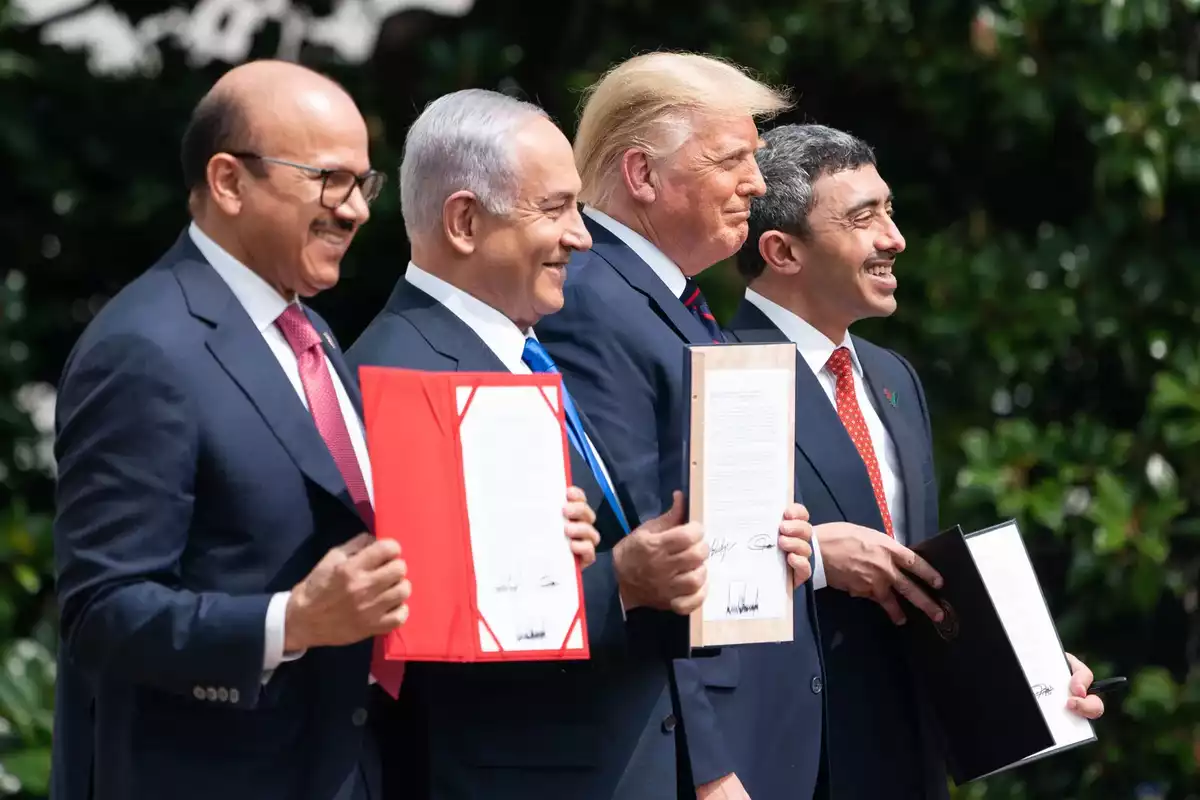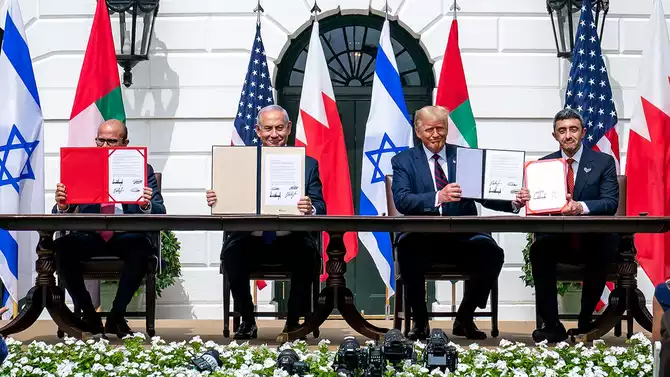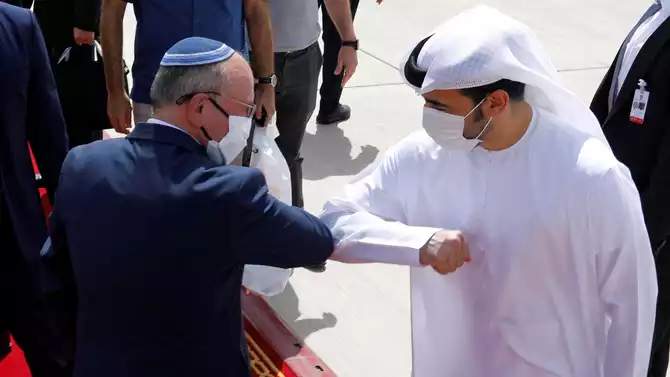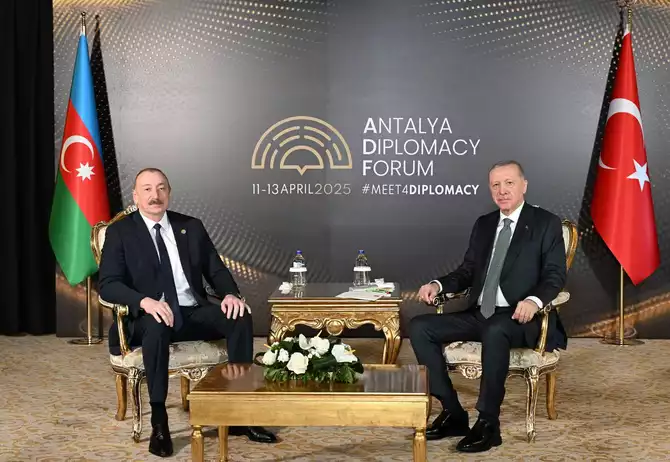
Photo credit: britannica.com
The Abraham Accords-signed between the State of Israel, the United Arab Emirates, Bahrain, Morocco, Egypt, and Sudan-marked a major step toward building lasting peace in the Middle East. These agreements represented the most significant diplomatic achievement of the 45th President of the United States, Donald Trump. Initially aimed at fostering rapprochement between Israel and the Arab world, the reference to Abraham served not only as a religious symbol of unity between Jews and Muslims but also as a reflection of their shared historical and genealogical roots.

From left, Minister of Foreign Affairs of Bahrain Dr. Abdullatif bin Rashid Al-Zayani, Israeli Prime Minister Benjamin Netanyahu, President Donald J. Trump and Minister of Foreign Affairs for the United Arab Emirates Abdullah bin Zayed Al Nahyan sign the Abraham Accords Tuesday, Sept. 15, 2020, on the South Lawn of the White House. (Official White House Photo by Tia Dufour)
Against this backdrop, the potential expansion of the Accords to include non-Arab nations, particularly Turkic Azerbaijan, is of special interest. This move may indicate a broader strategic vision that once aimed to bring other Muslim-majority countries into the fold. However, with the election of Joe Biden in 2020, this process was effectively stalled. Attempts by the 46th President’s administration to revive a similar initiative have produced no tangible results.
With Donald Trump’s return to the White House, the idea of forging strong economic and political ties between Israel and the Islamic world has regained momentum. The concept of combining Israeli technological innovation with the human and natural resources of Muslim nations is increasingly seen as a path toward sustainable development across large parts of the globe. In this context, Iran is viewed by the U.S. administration as the primary obstacle due to its continued destabilizing activities in the region.
Nonetheless, the vision of reshaping the Middle East and Central Asia remains relevant. Today, Washington’s attention is focused on three key countries: Azerbaijan, as the leading power in the South Caucasus, and Kazakhstan and Uzbekistan, as Central Asia’s most influential players.
On March 9, 2025, more than 50 American rabbis issued an appeal to President Trump, calling on him to expand the Abraham Accords to include Azerbaijan, Kazakhstan, and Uzbekistan. According to them, these Turkic nations are uniquely positioned to become advocates of a new philosophy of peace and progress-one grounded in mutual respect and strategic cooperation.
For Israel, its partnership with Azerbaijan holds both symbolic and strategic significance-particularly in the context of the Iranian threat, energy imports, and defense industry exports. On March 5, 2025, Israel’s Minister of Settlements Orit Strook emphasized the importance of Azerbaijan’s inclusion in the Abraham Accords, noting that such a step would require U.S. support, especially the repeal of Section 907 of the “Freedom Support Act,” which restricts American assistance to Baku.
Amid Israel’s ongoing efforts to solidify its anti-Iran doctrine, Azerbaijan is increasingly seen as a vital bridge to the Turkic nations of Central Asia. At the same time, Azerbaijan itself benefits significantly from cooperation with Israel, especially in economic and energy sectors.
During the visit of Azerbaijani Economy Minister Mikayil Jabbarov to Israel on March 17, 2025, Azerbaijan’s state oil company SOCAR signed a memorandum of understanding with Israel’s Union Energy. The agreement outlines plans for joint geological exploration in Israel’s exclusive economic zone. According to Minister Jabbarov, this will expand international cooperation and facilitate access to new energy resources.

Earlier, in January, SOCAR acquired a 10% stake in the Tamar gas field development project-one of Israel’s largest natural gas reserves. The project also includes participation from the UAE’s Mubadala Energy, which holds an 11% stake.
Israel has long earned its reputation as the “Startup Nation,” which carries significant implications for partner economies. Israeli companies are actively contributing to digital transformation in agriculture and green energy in Azerbaijan, Kazakhstan, and Uzbekistan.
Notably, back in 2021, Uzbekistan announced the creation of a joint investment fund worth $50 million with the U.S., Israel, and the UAE to support initiatives aligned with the Abraham Accords. The fund was designed to boost regional trade, advance strategic infrastructure projects, and enhance energy security.
Uzbekistan has also been investing in its knowledge economy, implementing a nationwide program to train one million programmers, while its blockchain legislation is recognized as one of the most advanced. Kazakhstan has invested heavily in its Astana Hub tech park, while Tajikistan and Kyrgyzstan are participating in the Digital CASA project aimed at developing IT infrastructure and expanding high-speed internet access.

Source: Reuters
Israel and the UAE are well-positioned to develop a cutting-edge IT industry in the region, integrated into the global digital ecosystem. Central Asia’s youth possess strong intellectual potential, and the creation of remote IT jobs could radically transform the region’s socio-economic landscape. Statistics show that one job in the IT sector generates an additional five jobs in related industries. This contributes to the expansion of the middle class and promotes inclusive development by creating opportunities for women, rural populations, and ethnic minorities.
Azerbaijan’s growing importance in U.S. regional policy is underscored by the March 14 visit of President Trump’s Special Envoy, Steve Witkoff, to Baku. Moreover, Azerbaijan is currently playing a mediating role in the normalization of relations between Türkiye and Israel.
On April 9, Baku hosted the first technical meeting between representatives of Ankara and Tel Aviv to develop a mechanism for preventing incidents in Syria. That same day, President Ilham Aliyev announced that Azerbaijan had already acted as a mediator during an earlier crisis between Türkiye and Israel: “We played an active role in bringing both sides closer.”

Source: AzerTAG
President Aliyev reiterated that Azerbaijan remains a loyal ally of Türkiye while maintaining strong and friendly relations with Israel: “Any misunderstanding between these two countries concerns us, as they are both our close friends.”
The expansion of the Abraham Accords beyond the Arab world is more than a diplomatic gesture-it represents a step toward forming a new system of international relations in Eurasia. The inclusion of Azerbaijan, Kazakhstan, and Uzbekistan reflects the recognition that sustainable peace requires the engagement of regional leaders with unique geopolitical positions, strategic resources, and a capacity for dialogue. If successful, this approach could serve as a model for other conflict-prone regions.
These countries have already demonstrated a readiness to engage in international cooperation, embrace technological modernization, and participate in projects centered on sustainable development. Their inclusion in the architecture of the Abraham Accords not only broadens the geography of peace but also brings the world closer to realizing the Sustainable Development Goals through a visionary partnership between Muslim and Jewish nations.
Share on social media